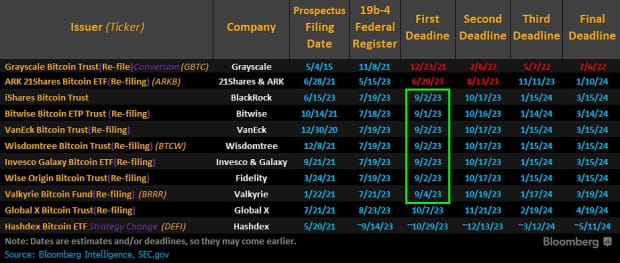Information headlines have just lately coated how China’s struggling economic system poses vital threat to international progress. Financial exercise and the stream of credit score within the area are weakening, and analysts aren’t satisfied that the Chinese language authorities’s interventions are a adequate repair for what seem like structural issues.
As an example, industrial output in July elevated by 3.7% in comparison with the earlier 12 months, which is slower than June’s progress price of 4.4%. Moreover, Chinese language banks issued 89% fewer new loans in July versus June, the bottom since late 2009.
Past its influence on international financial progress, there’s concern amongst buyers that the turmoil in China’s actual property market would possibly set off a ripple impact on the U.S. greenback and commodities. This, in flip, may create an unfavorable situation for Bitcoin (BTC).
On Aug. 28, the Shanghai Shenzhen CSI 300 Index, a key indicator of the Chinese language inventory market, initially surged by 5.5% earlier than finally closing the day with a 1.2% acquire. Regardless of this enchancment, Chinese language shares proceed to be among the many poorest performers globally in fairness indexes tracked by Bloomberg.
Bitcoin merchants have legitimate issues about potential repercussions from the Chinese language inventory market’s fluctuations. This unease arises from historic value developments and a broader shift in investor sentiment towards avoiding risk-on markets during times of macroeconomic uncertainty.

As proven within the chart above, Bitcoin’s value efficiency tends to align with the general motion of China’s inventory market, though these actions could be predicted or occur with a time lag. In actual fact, the 30-day correlation between the CSI 300 Index and Bitcoin/USD reached an unusually excessive 70% stage on Aug. 28.
Can China instill confidence in buyers?
Curiously, the latest surge within the inventory market seems to be primarily pushed by China’s measures introduced on Aug. 27. In response to Bloomberg, these measures reportedly included:
- Particular refinancing phrases to the true property sector, which ought to help the businesses in managing challenges and sustaining financial stability.
- Lowered charges that encourage corporations to purchase again shares, probably boosting inventory costs and investor confidence.
- Chosen buying and selling companies decreasing leverage margins, making buying and selling with borrowed funds extra accessible to buyers.
- New inventory choices are anticipated to face heightened regulatory scrutiny, decreasing the competitors for the present corporations.
- Limits on promoting beneath the preliminary public providing value for a particular interval to stop extreme volatility and defend buyers from speedy losses.
Nonetheless, it rapidly turned evident that the measures, which had been initially touted as financial stimulus, lacked the meant impact, in line with Ting Lu, chief China economist at Nomura Holdings. He famous that these measures “fall quick in halting the downward development and their influence might be short-lived except accompanied by help for the precise economic system.”
Along with the CSI 300 Index’s substantial 23.8% decline since July, there are clear indicators of overseas capital fleeing Chinese language shares. World funds offered round $1.1 billion value of shares on Aug. 28 alone, contributing to August’s outflows exceeding $11 billion, probably reaching a report stage, as reported by Bloomberg.
The essential query revolves round why China isn’t implementing efficient financial stimulus packages. The reply might lie within the nation’s forex worth. The yuan’s worth in opposition to the U.S. greenback has been constantly dropping, as depicted by the yuan value chart. This development is regarding, because it signifies the forex reaching traditionally low ranges.

Regardless of incentives like tax breaks, authorities bond buybacks and financial distributions to the inhabitants, which may result in elevated cash circulation and mounting debt, there’s a unfavorable influence on the buying energy of the yuan. The scenario is complicated and lacks a simple resolution, presumably leading to China experiencing considerably slower financial progress.
A robust U.S. greenback is unhealthy information for Bitcoin’s value
Curiously, the first beneficiary of the outflow from the Chinese language inventory market appears to be the inventory market in america, finally strengthening the U.S. greenback. As capital flows away from Chinese language equities, it tends to weaken the native forex, as buyers search lower-risk choices just like the S&P 500 index or U.S. cash market funds.
Sadly, this situation may current a problem for Bitcoin, contemplating it’s priced in {dollars} and competes as a substitute retailer of worth. For these anticipating a cryptocurrency rally because of a world financial downturn, it’s necessary to notice that the U.S. greenback doesn’t must be flawless; it solely must outperform different competing fiat currencies.
Nonetheless, market dynamics can swiftly rework as soon as buyers acknowledge the potential overvaluation of the U.S. inventory market or when indications of a looming average recession within the U.S. emerge, regardless of the relative power of the U.S. greenback in opposition to its counterparts. Consequently, the worth of Bitcoin as an unbiased and various hedge stays legitimate no matter being presently unable to reclaim the $29,000 help.
This text is for common info functions and isn’t meant to be and shouldn’t be taken as authorized or funding recommendation. The views, ideas, and opinions expressed listed below are the creator’s alone and don’t essentially replicate or characterize the views and opinions of Cointelegraph.









![Methods to Purchase DeFi Pulse Index on CoinStats [The Ultimate Guide 2022]](https://bitrrency.com/wp-content/uploads/2022/05/DeFi_Pulse_og-100x70.png)

